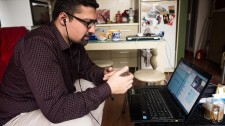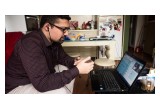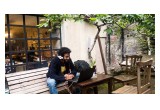Changing Roles: How Refugee Teachers Are Helping US University Students Learn Arabic

Shanghai, China, June 15, 2017 (Newswire.com) - For the tens of millions of refugees seeking asylum worldwide, reaching a country willing to take them in is only the first step to resettlement. Rebuilding career opportunities are often challenging in societies where their previous backgrounds may go undervalued.
For one group of refugees in Istanbul, teaching online Arabic lessons with students across the world has become a way to overcome these obstacles. Along with their language and culture, they have been able to share their stories with people who can learn from their struggles and perseverance. Their reflections after more than 300 lessons show the deep impact teaching has had on their self-esteem and optimism.
"What italki offered me is new students from another continent, far away from me, who want to learn my language. I feel that it's valuable for me. I care now about the language."
Abdullah, italki Arabic teacher
"Displacement is a challenge that I faced, but I'm not the only one,” said a Syrian teacher named Abdullah, who has been living in Istanbul for three years. “Now when some students are having problems, I can say, ‘Oh I faced that, this is not a big deal, I can help you.’ Now as a displaced guy, I'm really proud of myself."
Abdullah is one of 12 refugee teachers teaching Arabic lessons on language learning platform italki. Through online video chat, he has been able to connect with students for language lessons, with the intimacy of face-to-face learning experiences. As a professional and volunteer Arabic teacher in Istanbul, he believes online lessons are an important way to expand his horizons as an educator and share his knowledge with a wider range of learners.
"What italki offered me is new students from another continent, far away from me, who want to learn my language,” he said. “I feel that it's valuable for me. I care now about the language.”
This project was made possible by a collaboration including italki, NGO Small Projects Istanbul, and Vassar College. Their effort to connect refugee teachers with interested students has shown how diverse organizations can work together to make a difference.
The project began in 2015, when team members at italki contacted Small Projects Istanbul to discuss how the company could contribute to the organization’s work with refugees. The two organizations added Vassar College after discovering a common interest in connecting students at the college for exchanges with refugees. Students at Vassar then established an initiative at Vassar called Conversations Unbound.
italki and Conversations Unbound proceeded to coordinate with Small Projects Istanbul to welcome refugees with teaching backgrounds onto the company’s learning platform. Vassar College then made online conversation practice with the teachers a curriculum requirement for students enrolled in Arabic courses.
Now one semester and several hundred lessons later, organizers across the three organizations point to the teachers’ improved esteem and sense of opportunity as key accomplishments of the program.
“Beyond the benefit of providing work and income, the project has contributed to the growing confidence and revived hope in the teachers' lives,” said Shannon Kay of Small Projects Istanbul.
Elise Shea, Vassar undergraduate and founder of Conversations Unbound, emphasized the value of this experience for the students who took part.
“This program seeks to show that the world wishes to learn from the refugee, not the other way around. The refugee teaches us and we want to learn,” Shea said.
Participating students spoke to the practical value of learning with native speakers and the personal connections they made.
“It's super helpful, as someone who wants to learn Arabic, to have these practice sessions with a native speaker,” one Vassar Arabic student said.
“It's certainly nice to get to know and meet someone who's labeled as a refugee, beyond what the news is telling us, or beyond what your stereotypes might be, and just make a person to person connection,” offered another.
In addition to the students at Vassar, dozens of Arabic learners have reached out to schedule lessons with the teachers through italki’s online teaching marketplace, fulfilling organizers’ hopes that hosting them on the platform would lead to long-term work. Along with the benefits of having a stable income, the teachers have expressed appreciation for the experiences they have been able to share with their students.
“To me, teaching online means a lot, because I am helping people to connect with each other across the globe, and making it possible to share ideas,” said Syrian teacher Rahaf.
“I'm more involved with students now. I care about them, and I feel like when they are getting more and more from their Arabic, step by step improving their Arabic, I feel like ‘Wow, I'm improving myself,’ I feel happier,” Abdullah said.
italki continues to work closely with the teachers to support their independent work on the platform, and hopes to expand the program to other schools in Vassar’s network going forward.
To learn more, go to italki Refugee Outreach.
Media Contact:
Joe Fang
marketing@italki.com
Source: italki


